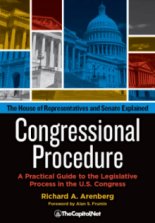Colloquy (CongressionalGlossary.com)
From the Congressional Glossary – Including Legislative and Budget Terms Colloquy Senators Rand Paul and Mike Lee hold colloquy on Senate floor Discussion between members during floor proceedings, generally to put on the record a mutual understanding about the intent of a provision or amendment. The discussion is often scripted in advance. Sens. Rand … Read more

